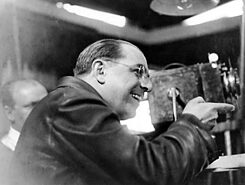German Cinema in Focus
We invite you to
Pandora’s Box (1929), directed by
G.W. Pabst. This is the
9th screening in our ongoing film series
German Cinema in Focus curated by
Shivani.
Pandora’s Box is the first of four films in the sub-section
Directors Special, spotlighting
G.W. Pabst, one of the masters of early German Cinema.
The film follows Lulu, a beautiful woman who exudes sexuality and charm despite her air of innocence and the men who are drawn into her siren spell. A new woman of the Weimar era, independent and sexually experienced, paves the way for tragedy and downfall of everyone around her in her guileless pursuit of pleasure.
Upon its initial release, this film was widely misunderstood, received negative reviews, and faced censorship. However, today, it is widely recognized as one of silent cinema's masterpieces. Much of this honour can be attributed to the unforgettable performance of its American lead, Louise Brooks.
Pandora’s Box (Die Büchse der Pandora)
by
Georg Wilhelm Pabst
1929 | b&w | 133 min.| silent
 © CINEMA-AUSTRIACO
Georg Wilhelm Pabst
© CINEMA-AUSTRIACO
Georg Wilhelm Pabst was an Austrian film director who went on to become a very influential German-Language filmmaker. His cinematic works are distinguished by their profound exploration of the human psyche and the depiction of individuals grappling with societal, cultural, and political challenges. His expertise in film editing is also noteworthy, with pioneering contributions such as continuity editing, the utilization of motivated point-of-view shots like the eyeline match, and the shot-reverse-shot technique for constructing dialogues. Furthermore, he enhanced the art of editing during sequences involving dynamic motion.
His films from the late 1920s and 1930s, contain a strong emphasis on the interrelationship between social conditions and the individual delving into how regular people grapple with the political turbulence, economic crises, and ethical decay that collectively contributed to the destabilization of the Weimar Republic. Some of his iconic films include Joyless Street (1925), Secrets of a Soul (1926), Pandora’s Box (1929), Diary of a Lost Girl (1929).
During the early 1930s, he transitioned into creating politically left-leaning films, including notable works like Westfront 1918 (1930), The Threepenny Opera (1931), and Comradeship (1931). However, this phase was short-lived because he was forced to cooperate with the Third Reich in producing propaganda films, which negatively impacted his career. Following the conclusion of the war, Pabst relocated to Vienna and directed films that strongly condemned anti-Semitism that helped restore his reputation. He died in 1967.
Back